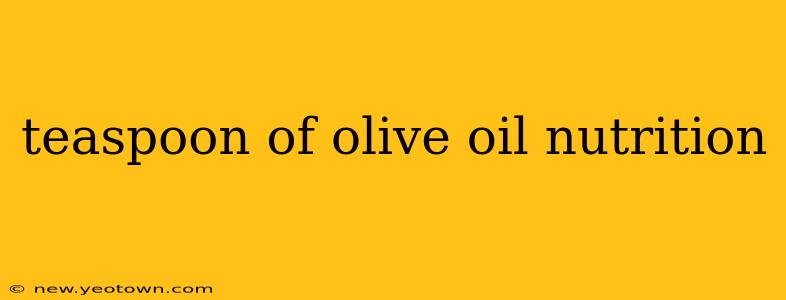Olive oil, that golden elixir extracted from sun-drenched olives, has been a culinary staple and a celebrated health food for millennia. But how much do we really know about the nutritional benefits packed into even a single teaspoon? Let's delve into the surprising nutritional profile of this everyday ingredient.
What are the nutritional benefits of a teaspoon of olive oil?
A single teaspoon (approximately 5ml) of extra virgin olive oil boasts a surprisingly robust nutritional profile. While it's primarily fat, it's the type of fat that matters most. Olive oil is predominantly composed of monounsaturated fatty acids (MUFAs), specifically oleic acid, which is renowned for its heart-healthy properties. These MUFAs help lower LDL ("bad") cholesterol and raise HDL ("good") cholesterol, contributing to a healthier cardiovascular system.
Beyond the fats, a teaspoon of olive oil also offers small amounts of vitamins and antioxidants. Vitamin E, a powerful antioxidant, protects cells from damage caused by free radicals. Olive oil also contains polyphenols, particularly hydroxytyrosol, which are potent antioxidants linked to various health benefits, including anti-inflammatory effects.
How many calories are in a teaspoon of olive oil?
A teaspoon of olive oil contains approximately 40 calories. While seemingly small, it's crucial to remember that fats are calorie-dense. So, while a teaspoon is a manageable portion, mindful consumption is key, especially if you're monitoring your daily caloric intake.
What are the health benefits of olive oil?
The health benefits of olive oil extend beyond its cholesterol-lowering effects. Studies suggest a link between regular olive oil consumption and a reduced risk of chronic diseases like heart disease, type 2 diabetes, and certain cancers. This is attributed to its rich antioxidant content and the beneficial effects of MUFAs on blood sugar regulation and inflammation.
Is a teaspoon of olive oil good for weight loss?
While olive oil is healthy, it's not a magic bullet for weight loss. The calorie density means that it contributes to your overall daily caloric intake. However, the healthy fats in olive oil can promote satiety, meaning you might feel fuller for longer after consuming it, potentially reducing overall food intake. Incorporating it as part of a balanced diet and regular exercise regime can support weight management goals.
Is it okay to consume a teaspoon of olive oil daily?
Moderation is key. A teaspoon of olive oil daily is generally considered safe for most adults as part of a balanced diet. However, individual needs vary, and consulting a healthcare professional or registered dietitian is always recommended, especially if you have pre-existing health conditions.
What is the difference between olive oil and extra virgin olive oil?
Extra virgin olive oil is considered the highest quality olive oil. It's obtained through mechanical pressing without the use of chemicals or heat, preserving its natural flavor and high levels of antioxidants. Regular olive oil may undergo more processing, potentially resulting in lower antioxidant levels and a milder flavor.
Can I use olive oil for cooking?
Olive oil's high smoke point makes it suitable for various cooking methods, including sautéing and baking. However, extra virgin olive oil, with its delicate flavor, might be best suited for low-heat cooking or used as a finishing oil to enhance the flavor of dishes after they've been cooked.
In conclusion, a simple teaspoon of olive oil offers a wealth of nutritional benefits. However, remember that a balanced diet and lifestyle are key to overall health. Enjoy this culinary treasure in moderation as part of a healthy eating plan.

